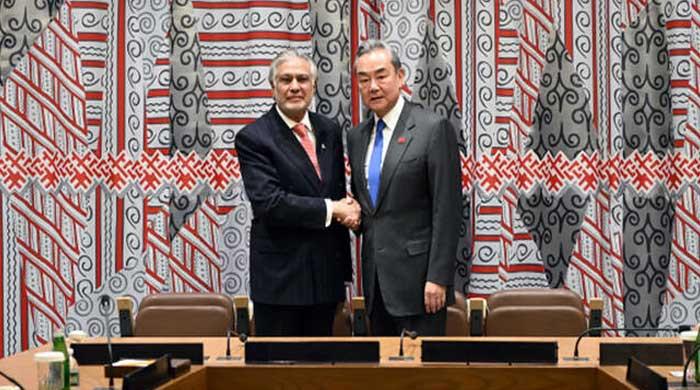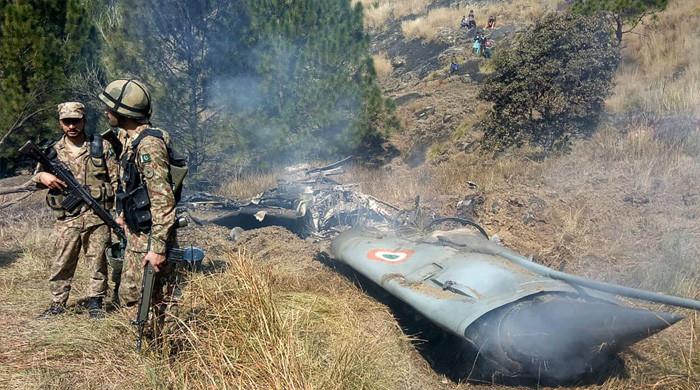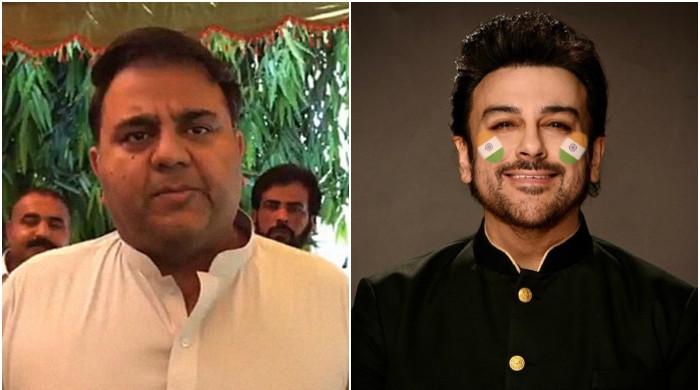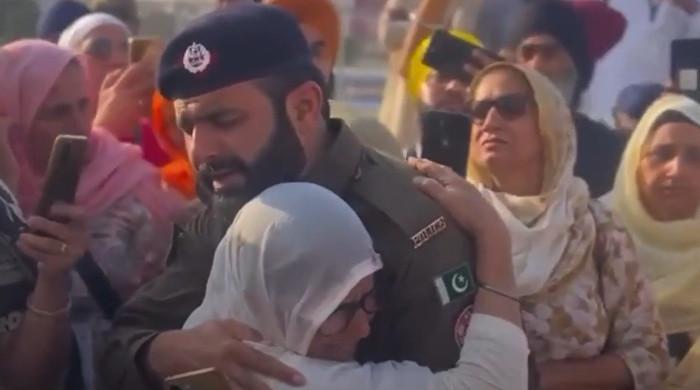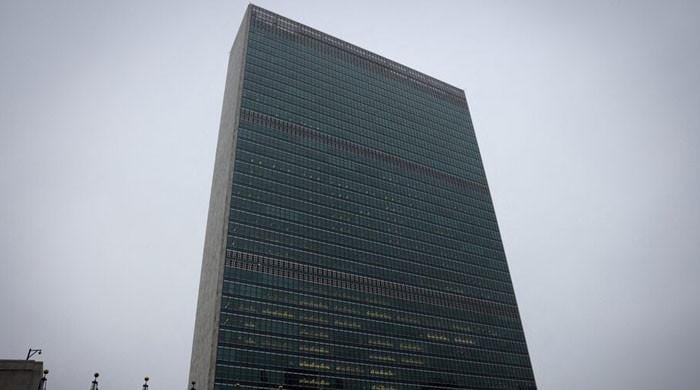Mubarak Sani case: Supreme Court omits controversial paras on govt's plea
CJP Isa-led bench says expunged paras can't be cited as precedent; JUI-F to observe "thanksgiving day"
August 22, 2024
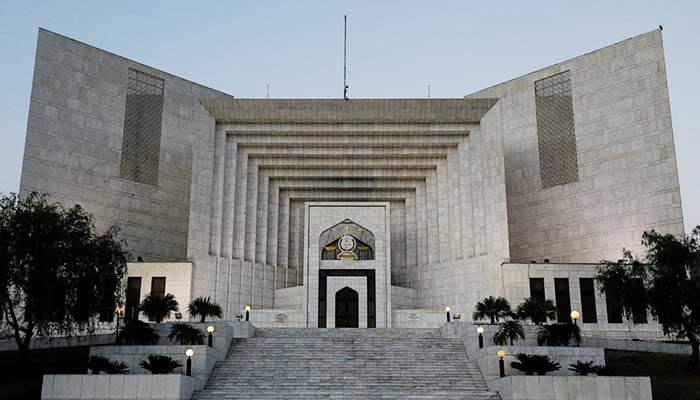
- Maulana Fazlur Rehman, Mufti Taqi Usmani attend hearing.
- "If we make a mistake, it should be corrected," says CJP Isa.
- SC decides matter in light of religious scholars' recommendations.
ISLAMABAD: The Supreme Court has approved the federal government’s appeal to expunge controversial paras from the contentious Mubarak Sani case verdict.
A three-member bench headed by Chief Justice Qazi Faez Isa and comprising Justice Amin-Ud-Din Khan and Justice Naeem Akhtar Afghan, on Thursday (today) heard the Centre's plea alongside the Punjab government’s petition seeking amendments to the top court verdict of February 6.
The apex court had overturned the conviction of sacrilege accused Sani, who sought deletion of certain charges framed against him in the case filed under Punjab Holy Quran (Printing and Recording) (Amendment) Act.
In its judgment, the court had noted that the offence that the defendant had been accused of was not criminalised till 2021. Consequently, the apex court set aside the conviction and ordered the immediate release of the petitioner.
After the verdict, the provincial government filed a review petition on the SC verdict under Article 188 of the Constitution, but on July 24 the top court declared it did not deviate in any way from the decisions of the Federal Shariat Court (FSC) and the Supreme Court, in approving the bail of the sacrilege accused.
The verdict favouring Sani drew outrage among religious circles, and a debate in the National Assembly's Standing Committee on Law and Justice where both the treasury and opposition benches agreed that the federal government file a petition in the Supreme Court.
Besides the Punjab government's plea seeking omissions of certain portions from the court’s July 24 revised verdict, the Centre also filed a miscellaneous plea on August 17 as per Prime Minister Shehbaz Sharif's directives.
The Punjab government in its petition maintained that some leading clerics and members of parliament requested the federal government to approach the top court and highlight some portions of the verdict that they said merited correction.
It further maintained that certain conclusions and observations made in other parts of the judgment seem to be a mistake and inconsistent with previous rulings of the highest court.
Jamiat Ulema-e-Isfam Fazl's Maulana Fazlur Rehman and Mufti Muhammad Taqi Usmani of Jamia Darul Uloom Karachi among the other religious scholars, who requested the federal government for approaching the apex court, attended today's hearing.
In the short verdict, the top court said the paras excluded from the verdict cannot be cited as precedent in any judgment.
Today's hearing
At the outset of the hearing, Attorney General for Pakistan (AGP) Usman Awan informed the court that parliament and certain religious leaders had urged the federal government to approach the top court on the matter again after the July 24 verdict.
While acknowledging that a "second review" of the original verdict was not possible, the AGP noted that the government had approached the court in accordance with the Code of Civil Procedure.
During the hearing, CJ Isa remarked: "If we make a mistake, it should be corrected."
The top judge apologised to Mufti Usmani, who attended the hearing virtually via video link, for not being able to view all the documents provided to the court by those who were served notices.
He then asked the cleric to identify the "mistakes" and "objections" in the verdict.
"Our country is a Islamic state where references to Quran and Hadith are made in the judicial decisions. I am not immune to making any mistake", CJP Isa stated.
Approving the provincial government's plea, the apex court decided to take assistance from Usmani, Fazl and other religious scholars on the matter.
Addressing the court, Mufti Usmani requested to expunge two paragraphs, no 7 and no 42, from the July 24 revised verdict and amend the part where the court accepted to omit the charges against the accused.
Paragraph 42 stated: “Details of the Constitutional and legal provisions and judicial precedents have proved that after declaring both groups of Ahmadis as non-Muslims, according to the Constitution and law, they have the right to practice their religion and express and preach it, provided that they will neither use religious terms for Muslims in public nor present themselves as Muslims in public.
“However, they have the right to ‘privacy of home’ in their houses, places of worship, and specific private institutions within ‘reasonable limits’ prescribed by law.”
Mufti Usmani, while explaining his stance, maintained that the term "tableegh" (to preach) was used in paragraph 42, which meant that "unconditional permission was granted" to Sani.
When summoned to the rostrum, Fazl also supported Mufti Usmani's requests and called for revision of the entire Supreme Court verdict.
"If you think Mubarak Sani deserves to be bailed then it is a different matter but all charges must be retained against his blasphemous actions," Fazl said while addressing the top judge.
He said Sani's trial should continue as per the the Council of Islamic Ideology's (CII) recommendation.
The court, after hearing opinion of various religious scholars who attended the proceedings, announced the decision to omit certain paras in admission to the recommendations of the CII and scholars' opinion, and stated that the expunged paras "will not be cited as precedent " in any future verdict.
It also directed the trial court to review the sections imposed against Sani in the light of law.
Talking to the media after the hearing, Fazl welcomed the SC's verdict and lauded CJP Isa for his "positive attitude" while hearing the matter.
He said that the apex court deleted all the controversial clauses from its previous verdict.
Fazl congratulated the religious groups on the favourable verdict and announced observing Friday (August 23) as 'thanksgiving day' to celebrate the verdict top court's judgment.




